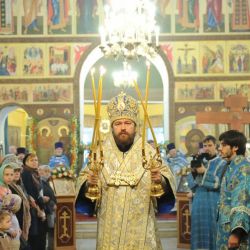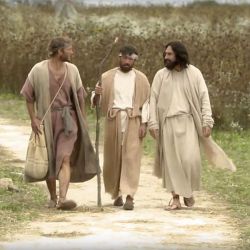The meeting of a fraternal community
The next day we visited the Institut Saint Philarète, a training site teeming with the life of the Fraternity. In the evening, we were invited to a meeting of one of its communities who had travelled from the city of Arkhangelsk in the Far North.
The meeting begins with the prayer of vespers and I am asked to comment on the Word of God. I am touched by the spiritual attention of the twenty or so participants sitting around a table in a small room lined with books.
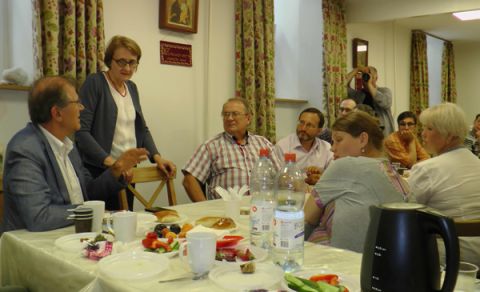 A meeting of the Brotherhood of Transfiguration
A meeting of the Brotherhood of Transfiguration
During the meal Olivier has the opportunity to share his vision and our pilgrimage towards 2033. This raised some reactions in the group. I remember Anya, an 18-year-old: “It is difficult for young people to get out of the culture of consumption and to become witnesses. I see 2033 as an opportunity for all Christians to be together and to touch with joy those who do not believe.”
The priest Sergei who accompanies this community also commented: “The Russian Church needs education and enlightenment by the Holy Spirit and above all to restore Christ in hearts rather than buildings. Meeting Christians who are spiritually open is always a great enrichment. We listen to the same Spirit. He does not divide. We give it a great place in the meetings of our fraternity. It is he who leads them. We look forward to seeing him at work in other churches and communities. We want to walk this path towards 2033 with you”.
We end the evening praying the invocation to the Holy Spirit of the Orthodox Church, holding hands: “King of heaven, Comforter, Spirit of truth everywhere present and penetrating everything ... come and stay in us ...!”
Faces of the Catholic Church in Russia
During our stay in Moscow we visited Leaders of the various churches. Let's start with the Catholic Church! Two other articles will talk about our meetings with members of the Orthodox Church, then Protestant and evangelical churches.
We meet Jean-François Thyri, a consecrated layman of Belgian origin, a member of the Communion and Liberation movement, who is waiting for us in the Pokrovsky Cultural Center www.dbiblio.org a meeting point for the spiritual and cultural traditions of the East and West, supported by Catholic and Orthodox partners.
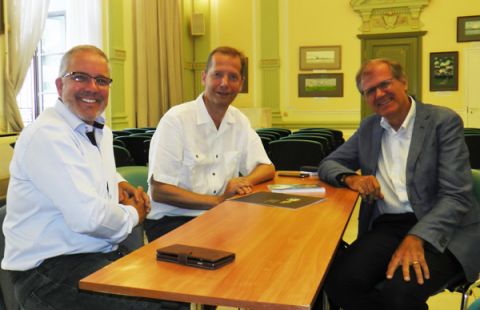 Olivier Fleury, Jean Francois Thyri, Martin Hoegger
Olivier Fleury, Jean Francois Thyri, Martin Hoegger
In the beautiful completely restored room, this man of great culture tells us about the situation of the Catholic Church in Russia. Whilst it is a minority, it is more open than other churches. The dialogue is also difficult because there is an important part of the Orthodox Church that refuses it.
“I hope that on this journey towards 2033 there will be a new awareness that all Christians are celebrating the same risen Christ. At first your project intrigued me, now it fascinates me. It would be a real shame not to take this opportunity to walk together and be transformed by Christ. I thank you for challenging us; you call us to focus on the essentials of our faith”.
In front of the Catholic Cathedral, Kirill Gorbunov, the Vicar General of the Diocese of Moscow welcomes us with a broad smile. We enter this sanctuary built in 1911, but closed to worship for 70 years during the Soviet regime and transformed into a multitude of offices on four floors! The cathedral was re-consecrated in 1991: at present Masses are celebrated in a dozen languages, a sign of Moscow's cosmopolitan character.
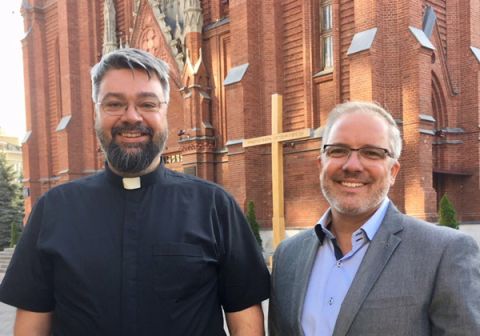 Kyrill Gorbunov,Olivier Fleury
Kyrill Gorbunov,Olivier Fleury
How does he imagine 2033? Above all, he hopes for more understanding between the two Orthodox and Catholic Churches. “What we need in Russia is first to bring people to Christ to become true disciples. Formation is essential to explain that every believer baptized in the name of the Father, the Son, and the Spirit is a true Christian”.
First serving, then talking
In Saint Thomas center, animated by the Jesuit community, Stephan Lipke, its director, welcomes us generously. As he had already heard about the project JC2033, he immediately gave his opinion on it: “We must do something in this direction, it is an opportunity not to be missed. It is good to have the blessing from the authorities, but we must also work with groups that are willing to do something other than live only the seven sacraments. With those who feel that a jubilee is like a sacrament”.
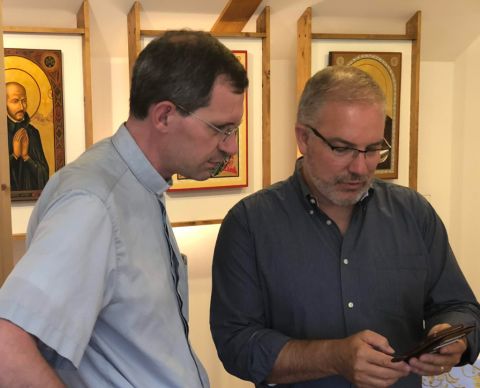 Stephan Lipke, Olivier Fleury
Stephan Lipke, Olivier Fleury
He thinks that the most important thing would be to wash one another's feet on Thursday before Easter 2033, because this gesture emphasizes service. To be a Christian means to be, in Christ, the servant of all.
"It is the missiological aspect of love in action that is most important. The talk must come after the service. You have to talk about the wounds of everyone ... there are not those who help and those who need help. We must feel that we all need the Lord who heals. "
Maybe the jubilee of 2033 could become the feast of all the churches if they don’t make it a political, he thinks: "Helping people in need without thinking of ourselves requires a lot of spiritual work, to understand that he who is with Christ should not be afraid of losing something.
In the evening we are invited to share the meal of the Focolare community, composed of Catholics and Orthodox. Of Slovak origin, Marcel Olejar notes how much the communist ideology has cut all roots in Russia, much more than in his own country.
Miguel, of Mexican origin, met several people who have recently discovered Christ, which is new to him. “Yes, there is a great need to make it known. Your project stimulates us to walk, pray and work together, as Pope Francis calls us”.
The next day, in a Ukrainian restaurant near the Kremlin, Alessandro Salacone shares his experience with the community of S. Egidio: "The world of dialogue is small in Moscow. But in truth, you have to look for people who are interested, because many are. Our community will pick them up on the periphery and invite them. The great job is to communicate a culture of Christian solidarity. Your project will contribute to it ".
Martin Hoegger


